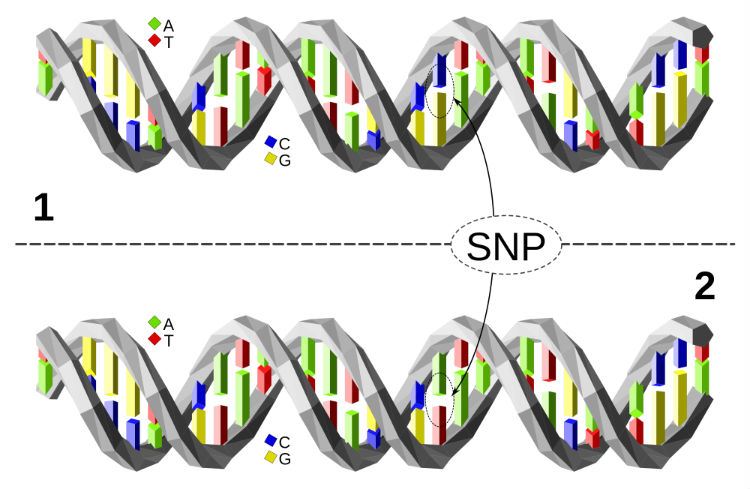Click here for the next article in the series.
The single nucleotide polymorphism (SNP; Figure) within the EPAS1 region was linked to significantly improved survival: 28.0 months vs. 52.5 months. A SNP may regulate gene and protein expression and be a determinant of optimal treatment. These data will enable clinicians to more effectively treat lung cancer and to change it from a terminal to a chronic disease.
"I think we are going to see dramatic changes in the number of people who are going to be long-term survivors of lung cancer," said Nathan Pennell, MD, PhD. "Patients can expect much more individualized and personalized therapy. I think we are getting much closer to turning lung cancer into a chronic disease." Dr. Pennell is Associate Professor of Medicine at the Taussig Cancer Institute of Cleveland Clinic.
SNPs Are Highly Clinically Significant
A recent study published in Nature reported that genetic instability contributes to the development of lung cancer. “For example, positive family history is an independent risk for this tumor, and recent studies have identified SNP polymorphisms in individual genes or micro RNAs associated with increased risk for this malignancy," the Nature researchers noted.
This study found that VEGF +405G/C SNP polymorphism is associated with risk of lung cancer. These emerging data indicate that the VEGF SNP plays an important role in the development and prognosis of lung cancer. Further understanding of this role will lead to improved, targeted therapies.
The authors identified answers to the following questions as important to the advancement of this approach:
- What are the SNPs of important clinical value? Are there any population/euthenics-specific SNP patterns?
- How do the SNPs affect the biological behavior of the tumor?
- What are the mechanisms underlying VEGF SNPs?
- Some SNPs of the VEGF gene are located in untranslated regions, what are the mechanisms of these SNPs?
NSCLC is Becoming a Chronic Disease
Genetic polymorphisms associated with cancer progression lead to variations in gene expression and may serve as prognostic markers for lung cancer. The publication News Medical has reported on the findings of Keiji Tanimoto, MD, and researchers at the Hiroshima University and Saitama Medical University in Japan. The team found that in patients with lung cancer, a single nucleotide polymorphism (SNP) may regulate gene and protein expression. This SNP could determine optimal treatment and be an accurate predictor of prognosis.
Data from Hiroshima
Genetic polymorphisms associated with cancer progression lead to variations in gene expression and may serve as prognostic markers for lung cancer. The publication News Medical has reported on the findings of Keiji Tanimoto, MD, and researchers at the Hiroshima University and Saitama Medical University in Japan. The team found that in patients with lung cancer, a single nucleotide polymorphism (SNP) may regulate gene and protein expression. This SNP could determine optimal treatment and be an accurate predictor of prognosis.
The association of the SNP within the EPAS1 region with overall survival for patients with lung cancer was assessed. The median survival time of patients with at least one A allele was significantly shorter than that of patients with the G allele (28.0 months vs. 52.5 months).
Response to Chemotherapy
A study published recently in Lung Cancer, found that SNPs in ERCC1 and iASPP were associated with response to chemotherapy or combined chemotherapy and radiotherapy in NSCLC patients.”
The study 230 patients with inoperable advanced NSCLC. Of these patients, 76 received platinum-based chemotherapy, 125 received chemotherapy plus radiation, and 29 received radiotherapy only. The SNPs were genotyped using the TaqMan methods.
“Among the patients who received chemotherapy only, ERCC1 (Asn118Asn) genotype was significantly associated with treatment response. Patients with either 1 or 2 T alleles (T/T + C/T) at Asn118Asn were more likely not to respond to platinum-based chemotherapy compared to those without the T allele (OR = 4.10, 95% CI: 1.31–12.85).
“For patients who were treated with both chemotherapy and radiotherapy, treatment response seemed to differ substantially between patients with different genotypes of iASPP (A67T). Patients carrying an A allele (A/T + A/A) at A67T were more likely to respond to combined chemotherapy and radiotherapy compared to those not carrying the A allele (OR = 0.25, 95% CI: 0.08–0.74). An association with treatment response was also suggested for the selected polymorphism in APE1, but no association was found for the ATM polymorphism,” the authors concluded.
